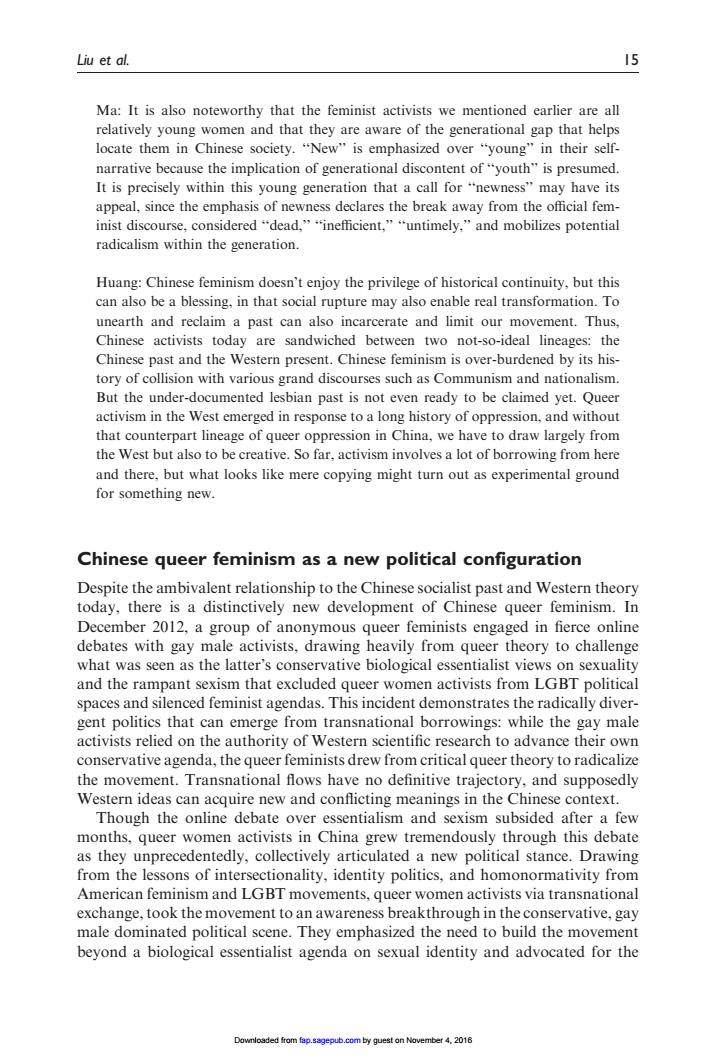正在加载图片...

Liu et al. Ma:It is also noteworthy that the feminist activists we mentioned earlier are all relatively young women and that they are aware of the generational gap that helps locate them in Chinese society."New"is emphasized over "young"in their self- narrative because the implication of generational discontent of"youth"is presumed. It is precisely within this young generation that a call for "newness"may have its appeal,since the emphasis of newness declares the break away from the official fem- inist discourse,considered“dead,”“inefficient,”“untimely,”and mobilizes potential radicalism within the generation. Huang:Chinese feminism doesn't enjoy the privilege of historical continuity,but this can also be a blessing,in that social rupture may also enable real transformation.To unearth and reclaim a past can also incarcerate and limit our movement.Thus, Chinese activists today are sandwiched between two not-so-ideal lineages:the Chinese past and the Western present.Chinese feminism is over-burdened by its his- tory of collision with various grand discourses such as Communism and nationalism. But the under-documented lesbian past is not even ready to be claimed yet.Queer activism in the West emerged in response to a long history of oppression,and without that counterpart lineage of queer oppression in China,we have to draw largely from the West but also to be creative.So far,activism involves a lot of borrowing from here and there,but what looks like mere copying might turn out as experimental ground for something new. Chinese queer feminism as a new political configuration Despite the ambivalent relationship to the Chinese socialist past and Western theory today,there is a distinctively new development of Chinese queer feminism.In December 2012,a group of anonymous queer feminists engaged in fierce online debates with gay male activists,drawing heavily from queer theory to challenge what was seen as the latter's conservative biological essentialist views on sexuality and the rampant sexism that excluded queer women activists from LGBT political spaces and silenced feminist agendas.This incident demonstrates the radically diver- gent politics that can emerge from transnational borrowings:while the gay male activists relied on the authority of Western scientific research to advance their own conservative agenda,the queer feminists drew from critical queer theory to radicalize the movement.Transnational flows have no definitive trajectory,and supposedly Western ideas can acquire new and conflicting meanings in the Chinese context. Though the online debate over essentialism and sexism subsided after a few months,queer women activists in China grew tremendously through this debate as they unprecedentedly,collectively articulated a new political stance.Drawing from the lessons of intersectionality,identity politics,and homonormativity from American feminism and LGBT movements,queer women activists via transnational exchange,took the movement to an awareness breakthrough in the conservative,gay male dominated political scene.They emphasized the need to build the movement beyond a biological essentialist agenda on sexual identity and advocated for the Downloaded from fap.sagepub.com by guest on November 4.2016Ma: It is also noteworthy that the feminist activists we mentioned earlier are all relatively young women and that they are aware of the generational gap that helps locate them in Chinese society. ‘‘New’’ is emphasized over ‘‘young’’ in their selfnarrative because the implication of generational discontent of ‘‘youth’’ is presumed. It is precisely within this young generation that a call for ‘‘newness’’ may have its appeal, since the emphasis of newness declares the break away from the official feminist discourse, considered ‘‘dead,’’ ‘‘inefficient,’’ ‘‘untimely,’’ and mobilizes potential radicalism within the generation. Huang: Chinese feminism doesn’t enjoy the privilege of historical continuity, but this can also be a blessing, in that social rupture may also enable real transformation. To unearth and reclaim a past can also incarcerate and limit our movement. Thus, Chinese activists today are sandwiched between two not-so-ideal lineages: the Chinese past and the Western present. Chinese feminism is over-burdened by its history of collision with various grand discourses such as Communism and nationalism. But the under-documented lesbian past is not even ready to be claimed yet. Queer activism in the West emerged in response to a long history of oppression, and without that counterpart lineage of queer oppression in China, we have to draw largely from the West but also to be creative. So far, activism involves a lot of borrowing from here and there, but what looks like mere copying might turn out as experimental ground for something new. Chinese queer feminism as a new political configuration Despite the ambivalent relationship to the Chinese socialist past and Western theory today, there is a distinctively new development of Chinese queer feminism. In December 2012, a group of anonymous queer feminists engaged in fierce online debates with gay male activists, drawing heavily from queer theory to challenge what was seen as the latter’s conservative biological essentialist views on sexuality and the rampant sexism that excluded queer women activists from LGBT political spaces and silenced feminist agendas. This incident demonstrates the radically divergent politics that can emerge from transnational borrowings: while the gay male activists relied on the authority of Western scientific research to advance their own conservative agenda, the queer feminists drew from critical queer theory to radicalize the movement. Transnational flows have no definitive trajectory, and supposedly Western ideas can acquire new and conflicting meanings in the Chinese context. Though the online debate over essentialism and sexism subsided after a few months, queer women activists in China grew tremendously through this debate as they unprecedentedly, collectively articulated a new political stance. Drawing from the lessons of intersectionality, identity politics, and homonormativity from American feminism and LGBT movements, queer women activists via transnational exchange, took the movement to an awareness breakthrough in the conservative, gay male dominated political scene. They emphasized the need to build the movement beyond a biological essentialist agenda on sexual identity and advocated for the Liu et al. 15 Downloaded from fap.sagepub.com by guest on November 4, 2016